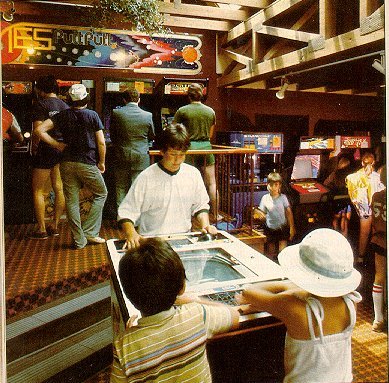
The quarters flow in: a "twinkle
box" arcade in Rockville, Md.
| "ONLY $729" gives you
control over "3 VIDEO GAMES" . . . Earn a "safe, high cash income with a
minimum of time & money" . . . "unheard-of returns" . . . "PRIME
LOCATIONS" . . ."complete guidance." Those are excerpts from ads trumpeting a way that housewives, retirees, executives—just about anybody—can cash in on the video game craze, or try to. It sounds like an easy road to riches: Buy or lease a few coin-operated video game machines like Pac-Man or Donkey Kong; arrange to set them up in bars, motels, |
convenience stores, arcades and
such; then come around every few days and collect bags of quarters, which you split with
the proprietor. It's no secret that a lot of quarters are clinking into these "twinkle boxes"—$5 billion in 1981 by some accounts. "Their high profit potential has made these electronic games an attractive investment," asserts a guide to getting in on the action. But missing from this beguiling picture is the fact that an array of booby traps awaits unwary investors.
|
And there's certainly more to it than just collecting all those quarters people are feeding the machines.
and hundreds of other newspapers, Jerlor Marketing, Inc., of Cincinnati promised maintenance, high-quality equipment and profitable locations in theaters, skating rinks, shopping centers and airports.
William Waters, 61, a San Antonio retiree, paid $18,000 to Jerlor for six machines featuring a game called Circle of Fun. He got neither the machines nor his money back.
"Only a few buyers ever received a machine at all," and they had to install them themselves in poor locations, says Kenneth H. Fletcher chief inspector for the U.S. Postal Service. The two Jerlor promoters were caught, convicted of mail fraud and sentenced to four years' imprisonment. Their victims lost more than $230,000.
- The principals of Marketing Associates, Inc., a now-defunct Denver operation, vanished just as the Federal Trade Commission moved in with an injunction. Many of the company's known customers (about 50) received nothing for their money; some got machines but no help in locating them, as had been promised. The average loss was $10,000. The head of the company, William E Beilman, had previously served two jail terms in Colorado for theft.
- David and Sue Reed of Arlington, Va., lost over $18,000 on five pinball machines. One was damaged when they unpacked it; the others broke down soon afterward.
The seller was Fascination International, Inc., of Schaumburg, Ill. The company has been accused by California authorities of failing to register its offerings and lying to customers.

